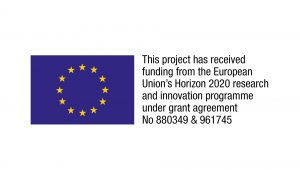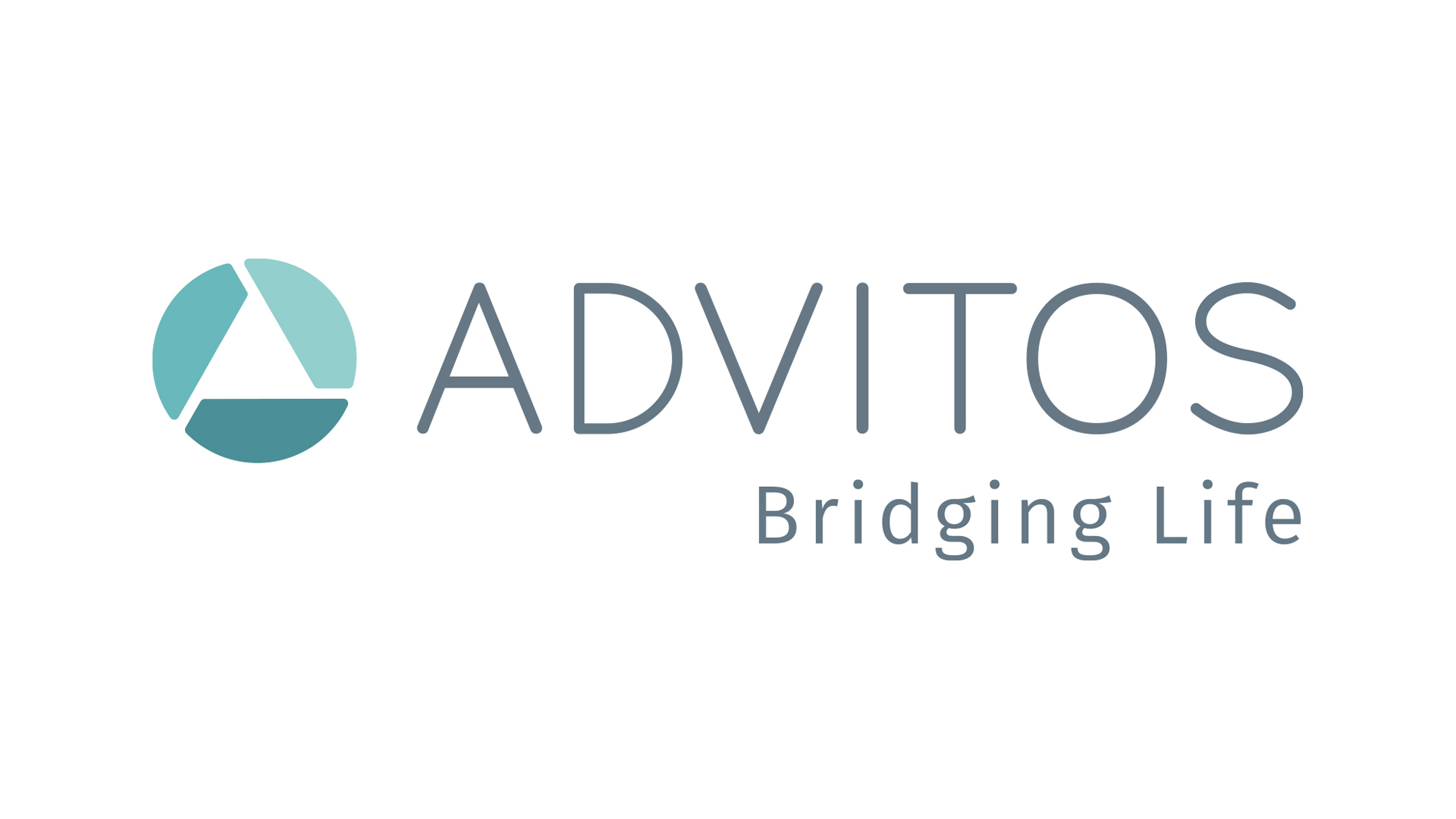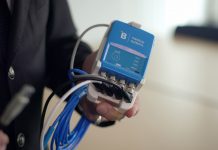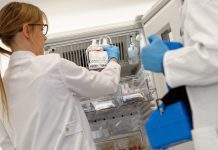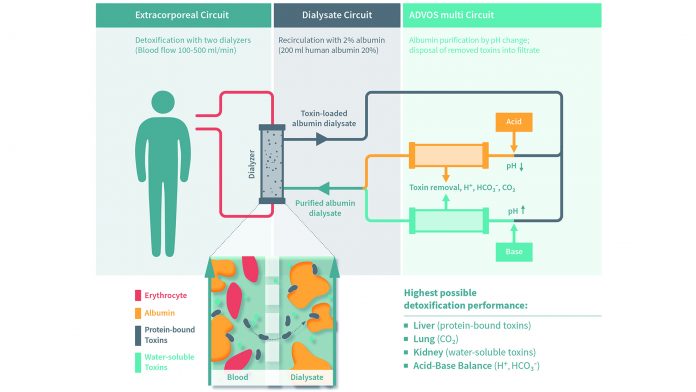
The ADVOS integrated 4-in-1 multi-organ support solution could dramatically improve survival rates of critically ill organ failure patients, including those with COVID-19.
Multi-organ failure (MOF) is responsible for the death of about half a million intensive care patients in Western Europe and the USA every year. This is about 60% of all deaths in intensive care units. In the wake of the COVID-19 pandemic, this number increased to about 750,000 patients in 2020.
By supporting four organs simultaneously, rather than sequentially as with previous solutions, the ADVOS (ADVanced Organ Support) therapy offers a holistic approach that gives multi-organ failure patients a much better chance of recovery.
The ADVOS multi device is an integrated 4-in-1 multi-organ support solution. The therapy enables liquid-based removal of water-soluble toxins (kidney), protein-bound toxins (liver, kidney), and (CO2 (lung). In addition, the ADVOS procedure enables the rapid correction of the acid-base balance through the targeted management of the blood pH. Pilot trials in critically ill patients have shown that this therapy could increase the chances of survival in cases of severe organ failure from 10 to 50%.
The ADVOS therapy: the first method worldwide for individualised multi-organ support
The ADVOS multi represents an evolution from conventional dialysis machines as it uses protein-enriched instead of regular dialysis water and allows targeted settings of the dialysis fluid pH and bicarbonate levels. Within the device, the dialysis fluid is permanently reprocessed and cleared of toxins in order to maintain consistently high detoxification performance.
The first and only 4-in-1-device: simultaneous support for all detoxification organs
- Liver support: removal of hepatic toxins;
- Lung support: extracorporeal CO2 removal in low-invasive settings;
- Kidney support: removal of water-soluble as well as protein-bound nephrotoxins; and
- Blood pH management: stabilising acid-base balance by direct removal of acid resulting in acidosis correction.
ADVOS therapy can positively influence the treatment of critically ill COVID-19 patients
Allescher et al1 conducted a study in 2021 with the goal of evaluating the ADVOS system as a treatment option in COVID-19 patients with multiple organ failure and carbon dioxide (CO2) removal problems.
For this study, 137 ADVOS treatment sessions with a median of 10 treatments per patient (IQR: 8-20 treatments) and a median duration of 22 hours (IQR: 15-24 hours) were performed. Anticoagulation was applied in all sessions, either alone (8%) or in combination with unfractionated heparin (92%).
The team at the university hospital of the Technical University Munich concluded that it was feasible to remove CO2 in the cohort of COVID-19 patients with ARDS (acute respiratory distress syndrome) and MOF by the ADVOS system. This efficient removal of (CO2 (continuous median elimination of 49 ml/min) was achieved at low blood flows up to 300 ml/min using a conventional hemodialysis catheter and without a membrane lung or a gas phase.
In contrast to other dialysis methods that add mainly bicarbonate, ADVOS ‘mimics’ what the kidney does and removes (CO2 directly (as protons and bicarbonate = H+ and HCO3–), thus supporting the renal compensation of respiratory acidosis.
Improving mortality using the ADVOS therapy
Fuhrmann et al.2 conducted a two-year interim analysis with 118 patients from four hospitals in Germany. This Extracorporeal Multi-Organ Support (EMOS)-Registry was conducted to collect data on real treatment conditions for patients for whom multi-organ treatment with ADVOS albumin dialysis was indicated. The aim of the EMOS-Registry was to create recommendations for ADVOS multi treatments and identify suitable supportive and diagnostic measures.
The analysis confirmed the results of previous publications showing the ADVOS therapy as a feasible and safe therapy in patients with multiple organ failure.
The ADVOS therapy removed water-soluble and protein-bound toxic substances and normalised and improved the blood composition in case of electrolyte disturbances, or acid-base disorders.
A trend towards mortality reduction in multi-organ failure patients treated with the ADVOS device was observed. In this analysis, the expected mortality, according to baseline SOFA-Score, was reduced from 80% to 60%.

Among survivors’ lower SOFA-Scores in comparison to non-survivors were observed (11 vs 16), suggesting a better outcome when the ADVOS treatment is not used as a last line therapy.
It was again confirmed that the therapy remains feasible and safe, and the results correlate well to those previously published. However, the 60% mortality remains high. Of course, this has to do with the fact that seriously ill patients were treated. In fact, at least 15 patients died before the end of the first session. The assessment that a patient will not benefit from the treatment is one of the most problematic points, not only with the ADVOS therapy but also with renal replacement or ECMO therapy. Although the ADVOS treatment can help at later stages (e.g. a patient with a SOFA-Score of 20 survived), an earlier start might be a more interesting approach.
A study by Kaps et al.3 also confirmed that the ADVOS therapy could reduce mortality. The study explored the applicability and safety of the ADVOS multi as discontinuous treatment in a regular dialysis unit and compared the outcome of the ADVOS treatment in a case-control study with intermittent hemodialysis (HD) with matched ACLF (acute-on-chronic liver failure) patients.
In ACLF, additional (multi-) organ failure occurs on top of acute decompensation of pre-existing chronic liver disease. It is a life-threatening condition (characterised by high 28-day mortality) that might occur in patients with liver cirrhosis. It appears in up to 40% of the patients with decompensation and is more frequent in young patients. Extracorporeal liver support systems help to remove toxins and metabolites and serve as a bridge therapy before liver transplantation.
Looking at the 28-day mortality, treatment with the ADVOS multi showed a lower (44% (11/25)) mortality compared to treatment with hemodialysis (60% (15/25)). A trend for improved long-term survival was also observed.
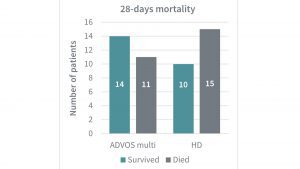
The studies show the feasibility and safety of the ADVOS therapy as a treatment option for COVID-19 patients as well as patients with multi-organ failure. They also confirm previous efficacy data on detoxification of water-soluble and protein-bound substances.
Key facts
- The only 4-in-1-device to provide multi-organ support for liver, kidney, lung and blood pH management;
- Clinical results: ADVOS treatment improves expected survival in multi-organ failure from 10% up to 50%;
- High performance and long-lasting efficacy of detoxification;
- Low-invasive and safe method: no large-lumen catheter necessary, blood flow and volume comparable to regular hemodialysis;
- Correction of acid-base imbalances by direct removal of acids; treatment of heavier metabolic and respiratory acidosis without bicarbonate; and
- Reduced operator effort.
References
- https://onlinelibrary.wiley.com/doi/10.1111/aor.14044
- https://journals.lww.com/md-journal/Fulltext/2021/02190/Registry_on_extracorporeal_multiple_organ_support.40.aspx
- https://journals.plos.org/plosone/article?id=10.1371/journal.pone.0249342
